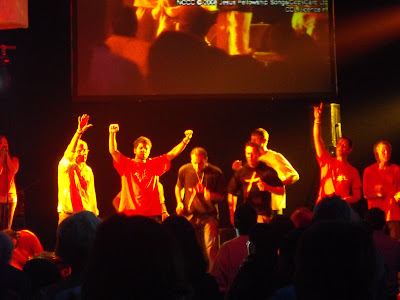
I read a disgusting blog post today. It was written by a leading Christian.
This particular influential Christian works a lot with students and I've followed him off and on over the years. He has some interesting and thoughtful things to say - what's more, years back he led one of my closest friends to faith. I rate him pretty highly.
But his blog horrified me.
Here's how it started:
Christmas is more than just buying presents, filling up on Turkey and tinsel. Christmas is all about the birth of Jesus. But so that you can focus on the real meaning of Christmas...
Nothing too shocking about that, you might think, but I confess I inwardly sighed as I read even these words. I get tired of the well-meaning but futile 'back to the original meaning of Christmas' line. Why? Not least because the original meaning is in fact a pagan midwinter festival. Christians only hijacked the feast around about the time of the fourth century around the time of the highly ambiguous 'conversion' of the Emperor, Constantine. (Hey presto! A status-quo-challenging, marginal movement morphed into a mainstream imperial power-structure. Historians debate the pros and cons. I'm very inclined to see it as something like a disaster.)
And so it concerns me when I see well-meaning and otherwise serious and deep-thinking Christians swept along by the Yuletidal wave which is the modern and hugely commercialised descendant of a pagan knees-up, or at best a fatally compromised Christianity.
But I realise the pagan-Christian-historical question may seem a bit remote to many. Besides, many Christians would say, 'Face the facts: people are into Christmas, and we may as well use it as an opportunity to broadcast the Christian message of Christ's coming'.
Not so fast. It's one thing if Christmas is just neutral - like art, for instance, something that can be an influence in many directions.
But I contend that Christmas is not neutral. It is immoral. Would you use pornography to promote Christ? I suspect not. Because Christians would generally see that as immoral and wouldn't want Christ to be sullied by association.
Christmas is immoral because it is the absolute epitome of the greedy, consumerist, pleasure-loving, unjust, Western system that is driving many of the world's population deeper into poverty, and many of its own into psychosis.
To link Christ's name with the festival of all this is nothing short of blasphemy.
And this brings me onto the real beef I had with the blog post. Remember where it left off? 'But so that you can focus on the real meaning of Christmas...'? You might expect that what follows would be some creative ideas for worship on 25th December. Or maybe some Christian outreach ideas. Better still, suggestions for how you can engage with the poor or destitute, or use one of the many excellent charitable 'alternative gifts' schemes.
Sadly, no. Cue the next bit of the blog:
But so that you can focus on the real meaning of Christmas I have done some searching online to find the best ideas I can for great christmas [sic] presents that will stand the test of time and keep the kids amused until next Christmas.
What follows? 2,569 words of product advertising. Books, board games, gadgets (everything from mobile phones to Wii to camcorders).
This apparently, is 'so you can focus on the real meaning of Christmas'.

I would like to think that this was a clever and prophetic indictment of the orgy of materialism that sweeps the western world each Christmas. But it just wasn't. He simply took for granted that Christmas was a time to shower one's children with more material possessions they don't need, to force feed them the spirit of the materialistic, consumerism-maddened culture which surrounds us. So he was just doing us a favour by helping us avoid the stress of choosing precisely what unecessary rubbish we should join the queues to purchase.
What's more, two and a half thousands plus words of crazed commercialism aren't enough: the writer cheerily informs us at the end of the post that there are 'More ideas coming soon…'
No thank you. No - please - no.
Because behind the merry-go-round, the Christmas whirl is making many sick. And a highly-informed, leading-edge, blogging Christian communicator should know about it.
An online poll by the mental health charity Mind found that respondents were stressed and anxious about repaying their Christmas spending. 19 per cent felt less able to manage their mental health because of worries about paying off the cost of Christmas; 25 per cent were feeling depressed because of Christmas; Over 50 per cent admitted they had spent more than they could afford on Christmas; 39 per cent used credit cards to cover the cost of Christmas; 33 per cent estimated that it would take them more than six months to pay off their Christmas spending debt.
Debt is a huge problem in our country and Christmas doesn't help one bit. Debt aid charity, Credit Action, reports:
The ghost of Christmas past continues to knock on some doors as nearly 1 in 4 (24%) Brits are still paying off credit costs from last Christmas. Over a third of people on a lower income (34%) are still paying off their bills from last Christmas.
Cash-strapped families who turn to credit to pay for Christmas could be setting themselves up for a New Year debt disaster... [A] survey found that a quarter of people planning to borrow over the festive period will use catalogue credit, a fifth are planning to use store cards and one in seven are planning to go to doorstep lenders - three of the four most expensive sources of credit.
Christians Against Poverty (CAP) commissioned a survey of 2000 adults asking them about their plans for funding Christmas expenditure in September 2008. The results show that 76% of those questioned were worried about Christmas due to the financial cost. 30% of respondents said they did not budget at all for Christmas.
So it's not just abstruse arguments about religion and history. Consumerism is killing people - literally, in some cases - and at Christmas it kills more people then ever.
I want thoughtful, responsible, leading Christians like my blogger friend to be speaking out for simplicity and for sanity. 'You don't have to get on the merry-go-round' I want him to say. 'By all means look for opportunities to bless others and to relax with loved ones over the holiday season. But do it simply, include your poor neighbour, do it as Christ would do it.'
That's what I wished he'd said.
As for me and my house, what will we be doing over Xmas (as I much prefer to call it since it is more respectful to Jesus)? We will throw our big shared house open to our many friends, some of whom have no family (and little else besides). We'll play games with paper and pens, or with nothing, 'give-us-a-clue' style. We'll go for a walk in the country. Some of us will volunteer at our drop-in for the homeless. We'll play with our children. We'll laugh with each other. No-one will say 'bah humbug' but we won't eat turkey, pull crackers, or have a pine tree in our living room. We'll drink no alcohol and be riotously happy. We'll give no presents except for love - which I trust will be shared out generously.
My kids can't wait.
 Someone took issue with a testimony posted on the Jesus Army website the other day. It was the story of a guy who'd got free from addictions through his faith in Jesus. (Check it out.) They wrote: 'So what ur saying is christians don't have addictions?? Now I've heard it all.'
Someone took issue with a testimony posted on the Jesus Army website the other day. It was the story of a guy who'd got free from addictions through his faith in Jesus. (Check it out.) They wrote: 'So what ur saying is christians don't have addictions?? Now I've heard it all.'







































